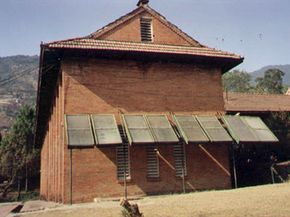Concerns About Solar Water Heaters
The No. 1 drawback to solar water heating is the upfront price. You can buy a new, high-efficiency gas or electric water heater for $500, and probably less; a solar water heater will run you anywhere from $1,000 to $3,500 installed [source: ToolBase]. You can lower that price by installing it yourself or building your own, but most people get it installed by experts since there's usually roof work involved. There are, however, federal (and possibly state) financial incentives available for installing solar water heaters, so your end cost will probably be lower.
It's important to remember, too, that you'll make that money back. But how long it takes to recoup the upfront investment depends on where you live, how much hot water you use, and the cost of electricity. If you live in an extremely sunny locale, use tons of hot water, and the cost of gas or electricity goes up each year, you're going to be saving more and you could make back the initial investment in just a few years. But if you're in Chicago, the cost of traditional energy decreases and you take five-minute showers, wash clothes in cold and wash dishes manually, your annual saving won't be as significant. In that case, it could take a decade to see a financial return on your investment.
Advertisement
Some other concerns include:
- Temperature: If you live in a very cold location, direct heater models (batch, thermosiphon and direct-active) might be unavailable to you due to the risk of freezing.
- Home orientation: To have an efficient setup, you need to have a mounting location with considerable sun exposure; city dwellings may not qualify.
- Water quality: If your home's water is particularly hard or acidic, you may not be a candidate for an active system. Hard or acidic water can corrode water-circulation systems.
- Power requirements: Since active systems rely on electrically powered machinery, they won't work during a power outage.
- Building regulations: Some areas, like those prone to earthquakes, have strict weight limits for roof-mounted equipment. A solar water heater might be too heavy.
As with solar-powered systems in general, a solar water heater may or may not be ideal for your particular circumstances. But it does offer some significant benefits that could make it worth the effort to make it work.
For more information on solar water heaters and related topics, look over the links below.
Related HowStuffWorks Articles
Sources
- Bainbridge, David. "Build a Solar Water Heater: An Integral Passive Solar Water Heater." Mother Earth News. January/February 1984.http://www.motherearthnews.com/Do-It-Yourself/1984-01-01/Solar-Water-Heater.aspx
- Dulley, James. 'Breadbox' Heater Saves Dough. Chicago Sun-Times. May 28, 1985.http://www.highbeam.com/doc/1P2-4285485.html
- Olsen, Ken. "Solar Hot Water Heater: A Primer." Arizona Solar.http://www.azsolarcenter.com/technology/solarh20.html
- Patterson, John. "Solar Hot Water Basics." Home Power Magazine.http://www.homepower.com/basics/hotwater/
- Solar Hot Water. U.S. Department of Energy.http://www.eere.energy.gov/de/solar_hotwater.html
- Solar Water Heaters. Energy Savers.http://www.energysavers.gov/your_home/water_heating/index.cfm/mytopic=12850
- Solar Water Heaters. ToolBase Services.http://www.toolbase.org/Technology-Inventory/Plumbing/solar-water-heaters
